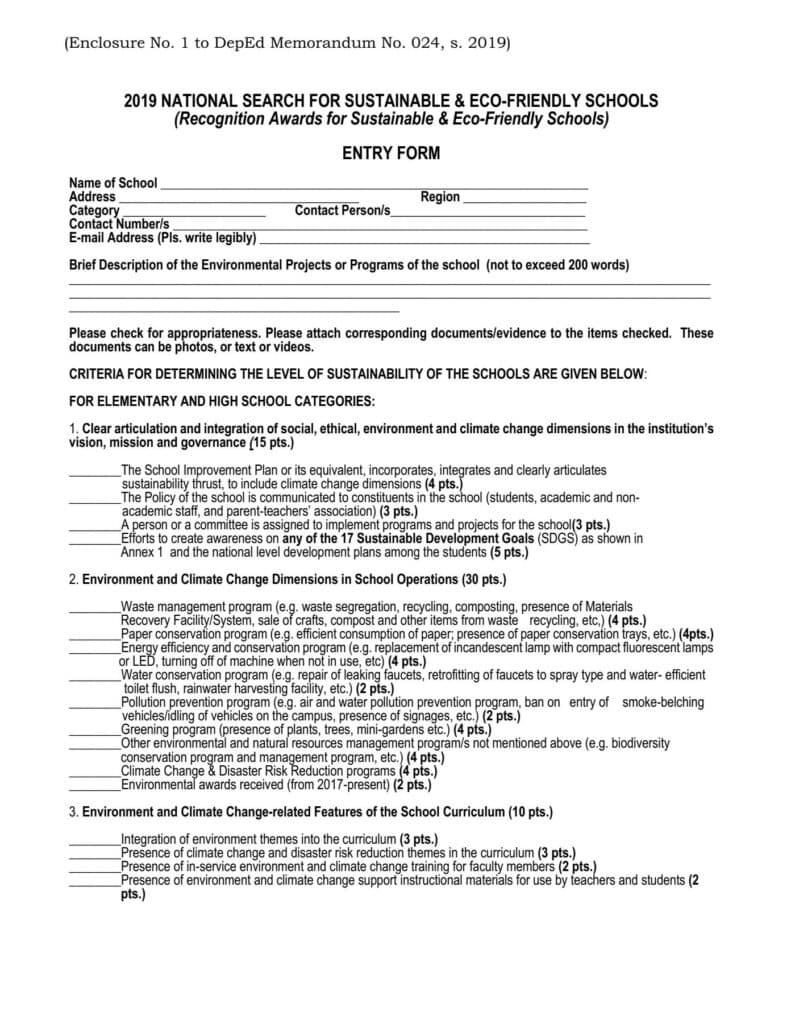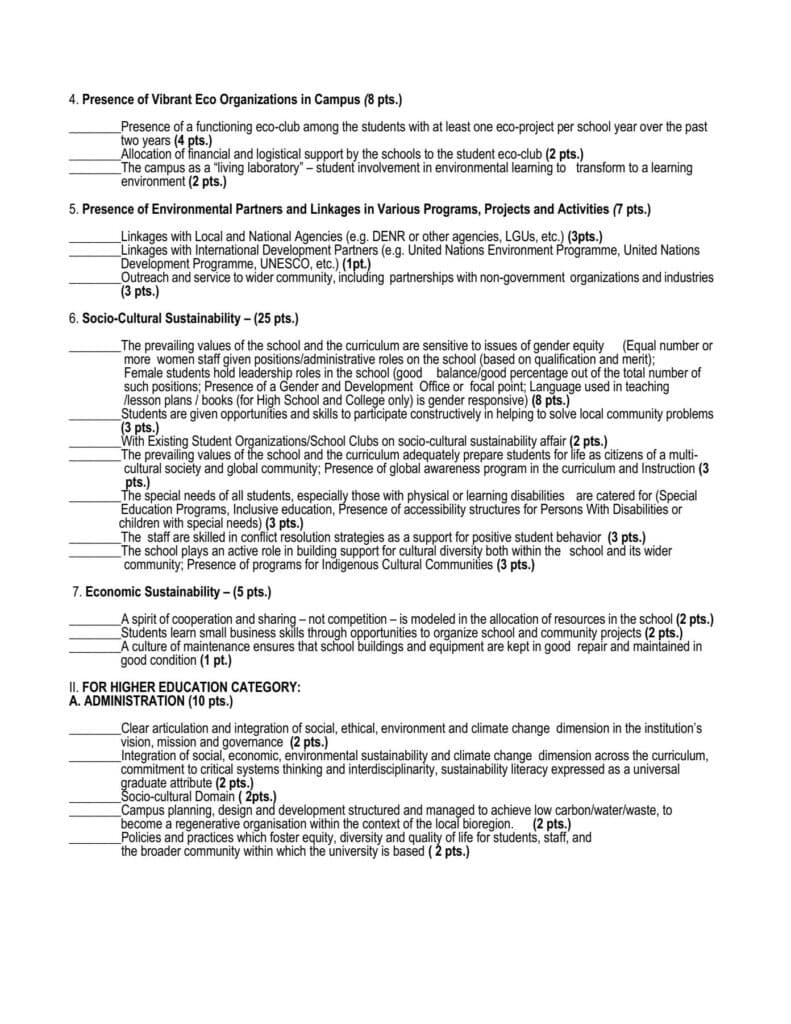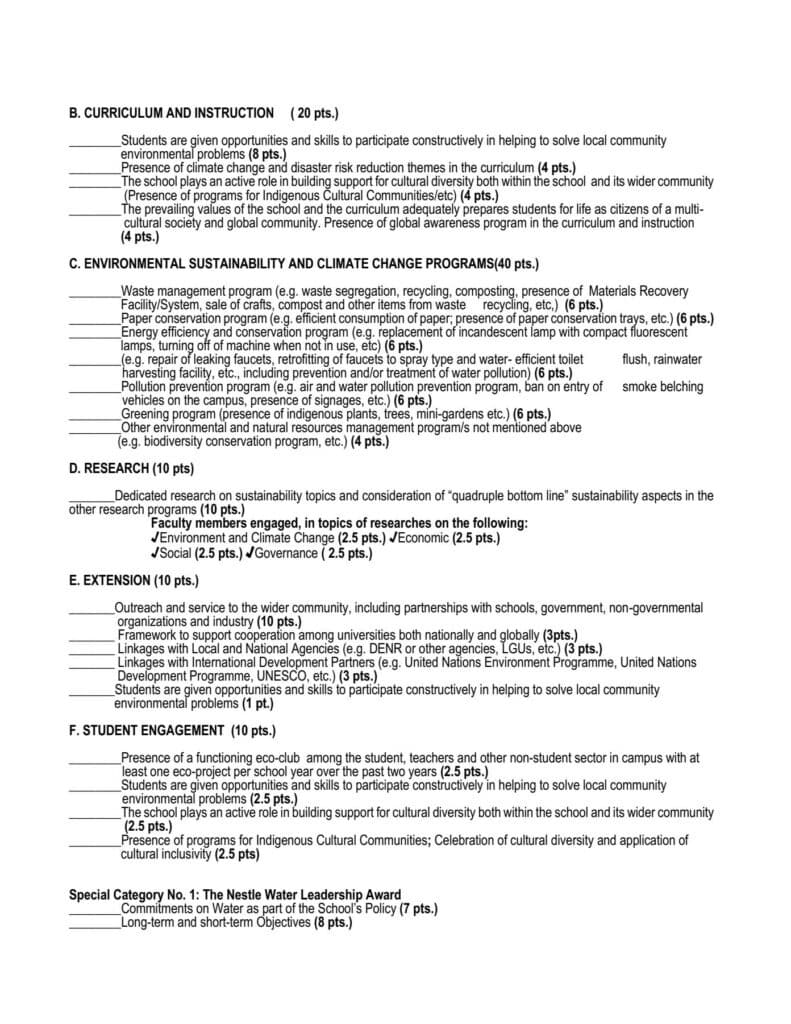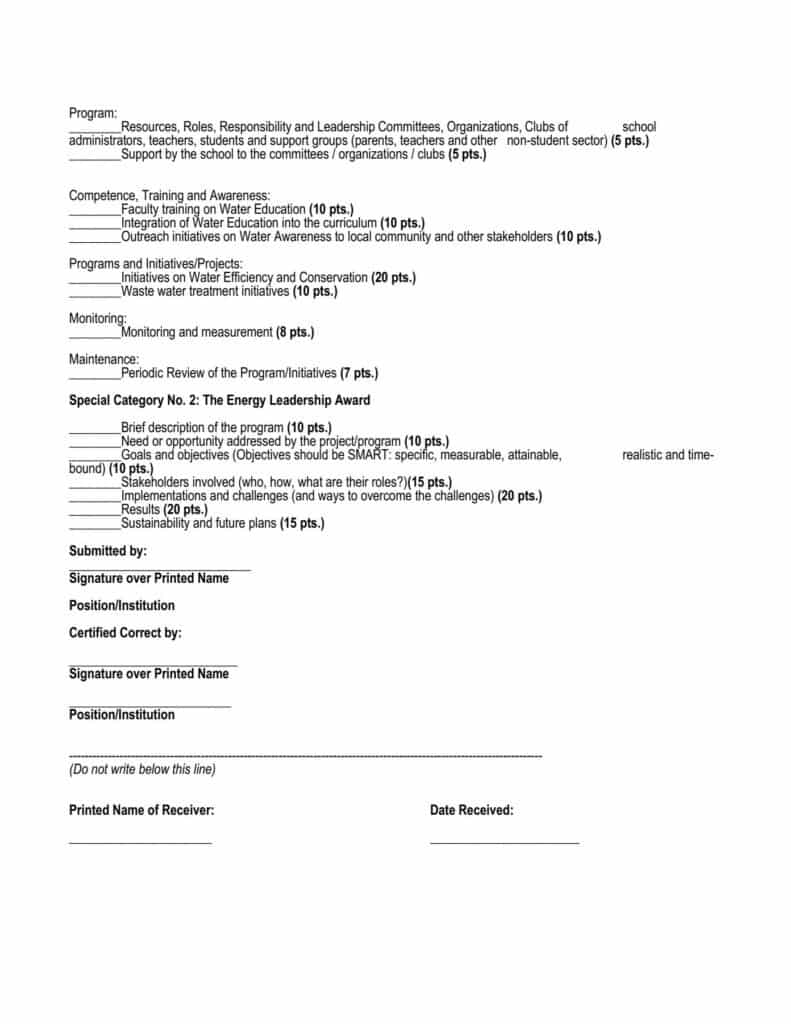February 26, 2019
DepEd Memorandum No. 24, s. 2019
Table of Contents
2019 NATIONAL SEARCH FOR SUSTAINABLE AND ECO-FRIENDLY SCHOOLS
To:
Undersecretaries
Assistant Secretaries
Bureau and Service Directors
Regional Directors
Schools Division Superintendents
Public and Private Elementary and Secondary School Heads
All Others Concerned
The Department of Environment and Natural Resources (DENR), through the Environmental Management Bureau (EMB), in cooperation with the Department of Education (DepEd), and the Commission on Higher Education (CHED), will conduct the 2019 National Search for Sustainable and Eco-Friendly Schools. This is pursuant to Republic Act No. 9512 entitled National Environmental Awareness and Education Act of 2008, and the ASEAN Environmental Education Action Plan for Sustainable Development for 2014-2018.
The search aims to encourage schools/academic institutions to become more actively involved in environmental issues at a practical and local level; and develop skills and understanding among students, faculty, and school administrators in initiating active responses and increasing community awareness and participation on environmental concerns.
The following documents are enclosed for reference:
- Enclosure No. 1 – Entry Form,
- Enclosure No. 2 – Rationale, and
- Enclosure No. 3 – Proposed Timelines.
The deadline for submission of entries is on April 26, 2019. Each category is requested to submit entries to the corresponding offices:
| Category | Office |
| Public Elementary and High Schools | Respective DepEd Schools Division Office |
| Private Elementary and High Schools Higher Education Institutions | Nearest DENR-EMB Regional Office |
For more information, please contact Ms. Maria Cristina A. Francisco or Mr. Nino P. Pinalva, National Program Secretariat, 2019 National Search for Sustainable and Eco-Friendly Schools, Environmental Education and Information Division, Environmental Management Bureau, Department of Environment and Natural Resources, 2nd Floor, HRD Building, DENR Compound, Visayas Avenue, Diliman, Quezon City at telefax nos. (02) 928-4674 and (02) 376-5610 or email at ecofriendlyschools@gmail.com or ecofriendlyschools@yahoo.com.
Immediate dissemination of this Memorandum is desired.
LEONOR MAGTOLIS BRIONES
Secretary
2019 National Search for Sustainable and Eco-Friendly Schools Entry Form

2019 National Search for Sustainable and Eco-Friendly Schools Entry Form 
2019 National Search for Sustainable and Eco-Friendly Schools Entry Form 
2019 National Search for Sustainable and Eco-Friendly Schools Entry Form 
2019 National Search for Sustainable and Eco-Friendly Schools Entry Form
Proposed Timelines for the 2019 National Search for Sustainable and Eco-friendly Schools

2019 NATIONAL SEARCH FOR SUSTAINABLE AND ECO-FRIENDLY SCHOOLS
Rationale:
“Overcoming poverty, gender equality, health promotion, environmental conservation and protection, rural transformation, human rights, intercultural understanding and peace, sustainable production and consumption, cultural diversity, and information and communication technologies – these are the key themes under the Global Action Program of the Post United Nations Decade of Education for Sustainable Development (UNDESD) that has been declared for the years 2005-2014 and National Environmental Education Action Plan for Sustainable Development for 2018 to 2040.
Education for sustainable development centers on awareness of sustainable development issues, enhancing knowledge, influencing values and attitudes, and encouraging responsive behavior and learning that leads to action. Information is a major component of education and a continuous campaign for massive environmental awareness is indeed necessary.
Under the country’s local response to the Global Action Program of the Post UNDESD and AEEAP, included in the National Environmental Education Action Plan for Sustainable Development is a national program that would encourage schools to establish sustainable and eco-friendly schools. The school system is a vital part of our basic learning and is seen as a powerful vehicle for change. The school population, comprising of the students, teaching and non-teaching personnel, constitute a sizeable percentage of the national population. As such, any program focused on advocacy and other multi-faceted program of activities done within the school system especially relating to environmental concerns needs to be documented, encouraged, and recognized.
Sustainable and Eco-Friendly Schools may be described as environment-friendly schools that have initiated and integrated in their instruction, research, extension and/or administration, programs which are environment-related. The promotion of this program for the establishment and/or strengthening of sustainable and eco-friendly schools in the country had been enshrined as a priority to the Post ASEAN Environment Year 2015 Celebration with the theme “Empowering the Youth for a Green ASEAN Community”, and likewise in the Road Map for the Implementation of Republic Act No. 9512 also known as the National Environmental Awareness and Education Act of 2008 under the National Environmental Education Action Plan for Sustainable Development (2009-2018).
In 2009, the National Search for Sustainable and Eco-Friendly Schools was launched, as a partnership program among the Department of Environment and Natural Resources, thru the Environmental Management Bureau, the Department of Education, Commission on Higher Education, with Smart Communications Inc. Nine schools were declared as national champions, with the best being the following: Penablanca East Central School in Cagayan for Elementary; La Castellana National High School in Negros Occidental for High School; and Palawan State University in Palawan for College. Meanwhile, for 2011 National Search for Sustainable and Eco-Friendly Schools, the following emerged as winners: Iliranan Elementary School in Negros Occidental for Elementary; Camarines Sur National High School in Naga City for High School; and De La Salle University-Dasmarinas in Cavite for Colleges.
In 2013 National Search for Sustainable and Eco-Friendly Schools, the following emerged as winners: Dubinan Elementary School in Santiago City, Isabela for Elementary; Ateneo De Davao University-High School in Davao City for High School; and Visayas State University in Baybay City, Leyte for Colleges. In 2015 National Search for Sustainable and Eco-Friendly Schools, the following emerged as winners: Divisoria Elementary School in Santiago City, Isabela for Elementary; Bintawan National High School in Villaverde, Nueva Vizcaya for High School; and Foundation University in Dumaguete City, Negros Oriental for Colleges. And in 2017 National Search for Sustainable and EcoFriendly Schools, the following emerged as winners: Payao Elementary School in Payao, Binalbagan, Negros Occidental (Negros Island Region), Divisoria High School in Santiago City, Isabela (Region 2- Cagayan Valley) and Don Mariano Marcos Memorial State University – North La Union Campus in Bacnotan, La Union (Region 1 – Ilocos Region) for Colleges.
For 2019, another National Search for Sustainable and Eco-Friendly School is in place, to give recognition to the environmental initiatives of schools over the country. The National Search that will give recognition awards to Best Schools is planned to repeat periodically.
The following can be adopted in pursuit of sustainable and eco-friendly schools:
- developing environmental policies for the school;
- campus planning, design and development structured and managed to achieve and surpass zero net carbon/water/waste to become a regenerative organization with the context of the local region;
- physical operations and maintenance focused on supporting and enabling enabling zero net carbon/water/waste goals including effective monitoring , reporting and continual improvement;
- policies and practices which foster equity , diversity, and quality of life for students, staff, and the broader community within which the university/school is based;
- physical cleanliness, orderliness and beautification of the school;
- energy conservation and efficiency and electrical safety;
- water conservation/water management (maintenance of potable water) including prevention and/or treatment of water pollution;
- paper conservation/paper recycling;
- waste prevention, reduction, waste segregation, recycling and composting;
- air, water and soil pollution control;
- seedling production/vegetable gardening and marketing;
- reforestation and/or nursery establishment;
- establishment of a botanical garden;
- herbarium;
- establishment of bio-park;
- environmental audits of school’s operations and facilities;
- integration of environmental themes into the school curriculum;
- conduct of in-service environmental training for faculty members;
- presence of environmental clubs/organization;
- development of environmental support instructional materials;
- offering of environmental degrees/certificate programs;
- environment and natural resource-related research works and studies;
- linkages and exchanges on the environment with the following sectors: national government agencies, non-government organizations, religious organizations, local government units, business and industry sector, among others;
- environmental awareness and community education, holding of green fairs and environmental exhibits/sale of green products, holding of seminars and/or conferences/symposia, holding of eco- tours or ecological destinations, healthy lifestyle campaigns;
- climate change mitigation and adaptation programs;
- disaster risk reduction and management programs;
- celebration of cultural diversity and application of cultural inclusivity; and
- framework of support cooperation among universities/colleges/schools both nationally and globally
Objectives of the Program:
- To encourage schools/academic institutions to become more actively involved in environmental issues at a practical and local level; and
- To develop skills and understanding among the students, faculty and school administrators in initiating active responses and increasing community awareness and participation on environmental concerns.
Mechanics:
A scheme of rating the extent of sustainability and eco-friendliness of school had been jointly drawn up by the Environmental Management Bureau of the Department of Environment and Natural Resources, with the Department of Education, Commission on Higher Education, and some civil society and private sector groups.
CRITERIA FOR DETERMINING THE LEVEL OF SUSTAINABILITY OF THE SCHOOLS ARE GIVEN BELOW:
I. FOR ELEMENTARY AND HIGH SCHOOL CATEGORY:
Clear articulation and integration of social, ethical, environment and climate change dimensions in the institution’s vision, mission and governance (15 points)
| Points | |
| The School Improvement Plan or its equivalent, incorporates, integrates and clearly articulates sustainability thrust, to include climate change dimensions | 4 pts. |
| The Policy of the school is communicated to constituents in the school (students, academic and non-academic staff, and parent-teachers’ association). | 3 pts. |
| A person or a committee is assigned to implement programs and projects for the school | 3 pts. |
| Efforts to create awareness on SDGS (on any of the 17 Sustainable Development Goals) and the national level development plans among the students | 5 pts. |
Environment and Climate Change Dimensions in School Operations
Environmental Domain (30 pts)
| Waste management program (e.g. waste segregation, recycling, composting, presence of Materials Recovery Facility/System, sale of crafts, compost and other items from waste recycling, etc,) | 4 pts. |
| Paper conservation program (e.g. efficient consumption of paper; presence of paper conservation trays, etc.) | 4 pts. |
| Energy efficiency and conservation program (e.g. replacement of incandescent lamp with compact fluorescent lamps, turning off of machine when not in use, etc) | 4 pts. |
| Water conservation program (e.g. repair of leaking faucets, retrofitting of faucets to spray type and water- efficient toilet flush, rainwater harvesting facility, etc.) | 2 pts. |
| Pollution prevention program (e.g. air and water pollution prevention program, ban on entry of smoke belching vehicles/idling of vehicles on the campus, presence of signages, etc.) | 2 pts. |
| Greening program (presence of plants, trees, mini-gardens etc.) | 4 pts. |
| Other environmental and natural resources management program/s not mentioned above (e.g. biodiversity conservation program and management program, etc.) | 4 pts. |
| Climate Change and Disaster Risk Reduction programs | 4 pts. |
| Environmental awards received (from 2017-present) | 2 pts. |
Environment and Climate Change-related Features of the School Curriculum (10 points for all categories)
| Integration of environment themes into the curriculum | 3 pts. |
| Presence of climate change and Disaster Risk Reduction themes in the curriculum | 3 pts. |
| Presence of in-service environment and climate change training for faculty members | 2 pts. |
| Presence of environment and climate change support instructional materials for use by teachers and students | 2 pts. |
Presence of Vibrant Eco Organizations in Campus (8 points in all categories)
| Presence of a functioning eco-club among the students with at least one ecoproject per school year over the past two years | 4 pts. |
| Allocation of financial and logistical support by the schools to the student ecoclub | 2 pts. |
| The campus as a “living laboratory” – student involvement in environmental learning to transform to a learning environment | 2 pts. |
Presence of Environmental Partners and Linkages in Various Programs, Projects and Activities (7 points for all categories)
| Linkages with Local and National Agencies (e.g. DENR or other agencies, LGUs, etc.) | 3 pts. |
| Linkages with International Agencies (e.g. United Nations Environment Programme, United Nations Development Programme, UNESCO, etc.) | 1 pt. |
| Outreach and service to wider community, including partnerships with nongovernment organizations and industries | 3 pts. |
Socio-Cultural Sustainability – (25 points)
| The prevailing values of the school and the curriculum is sensitive to issues of gender equity – Equal number or more women staff given positions/administrative roles on the school (based on qualification and merit) – Female students hold leaderships roles in the school (good balance /good percentage out of the total number of such positions – Presence of a GAD Office or GAD focal point – Language used in teaching /lesson plans / books (for HS and College only) is gender responsive | 8 pts. |
| Students are given opportunities and skills to participate constructively in helping to solve local community problems | 3 pts. |
| The prevailing values of the school and the curriculum adequately prepare students for life as citizens of a multi-cultural society and global community Presence of global awareness program in the curriculum and instruction | 2 pts. |
| The special needs of all students, especially those with physical or learning disabilities are catered for – Special Education Programs – Inclusive education – Presence of accessibility structures for Persons With Disabilities/PDAs or children with special needs | 3 pts. |
| The staff are skilled in conflict resolution strategies as a support for positive student behavior – Guidance counselor with record of counseling cases – Presence of program for conflict resolution – Grievance committee – Implementation of DepEd Child Protection Policy (including anti-bullying) | 3 pts. |
| The school plays an active role in building support for cultural diversity both within the school and its wider community Presence of programs for Indigenous Cultural Communities | 3 pts. |
| Existing Student Organizations/School Clubs | 2 pts. |
Economic Sustainability – (5 points)
| A spirit of cooperation and sharing – not competition – is modeled in the allocation of resources in the school | 2 pts. |
| Students shall learn small business skills through opportunities to organize school and community projects – Such as a Young Entrepreneur Cooperative in School or its equivalent – Environment-friendly Income- generating Activities/Programs/Projects with financial report | 2 pts. |
| A culture of maintenance ensures that all school buildings and equipment are kept in good repair and maintained in good condition – Presence of report indicating level of involvement of stakeholders in the Brigada Eskwela Program – Presence of institutionalized feedback mechanism for school maintenance | 1 pt. |
Continue Reading: